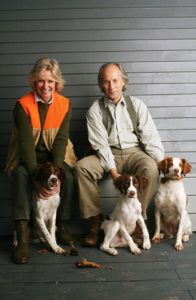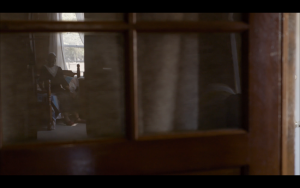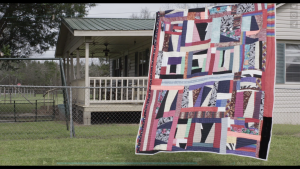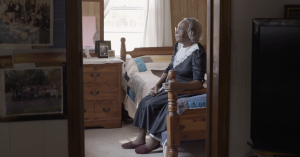Masculinity is a recurring theme in Richard Ford’s stories, unsurprising as they are all told by male narrators. His stories also involve the absence, passivity, or transience of a woman as well as affairs by either a female character, the male character, or both. This is clear in “Winterkill” as well as in this one, but I will discuss only “Going To The Dogs” below:

Richard Ford and his wife Kristina Hensley with their dogs
The narrator is a man who, in this story, attempts to recapture or remake his idea of masculinity. One of the supposedly masculine traits is to be invulnerable. This is immediately apparent in the opening paragraph:
“My wife had just gone out West with a groom from the local dog track, and I was waiting around the house for things to clear up, thinking about catching the train to Florida to change my luck. I already had my ticket in my wallet.”
His wife had left him for another man, but there is no emotional vulnerability from the narrator. He immediately moves on to tell us he’s thinking of going to Florida to make some money, as if he is already past his wife’s infidelity and abandonment. Men cannot show weakness for it is against the typical perspective of manhood.
It is interesting, then, to note that the narrator takes on perceived “feminine” traits in that he wears a bathrobe and bakes coffee cake in the morning. And while his home is a pigsty (stereotypical bachelor pad), it is Phyllis who cleans his home “so that when I cleared out I wouldn’t have to do that myself.” (108) Again, this adds to the standard norm of masculinity: men don’t do the housework.
Furthermore, the narrator’s deliberate intention to remain invulnerable is not solely in the beginning. On page 102, he says, “I didn’t like Phyllis nearly as well as Bon…I didn’t like that Phyllis knew so much, even if the particulars were not right on the money.” He has to keep emotionally distant; even we, the readers, never know his real name or anything substantial about him. There always remains a distance between us and the narrator.
Another trait believed to be masculine is that of sexual potency; a trait of a real man is his ability to satisfy a woman. The narrator lost this when his wife left him; typical thinking in these cases from the one who was cheated on is that they could not sexually satisfy their partner. When Bonnie flirts with him and compliments his body before they sleep together he says,
“I liked that. It made me feel good. It made me feel reckless, as if I had killed a deer myself and had a lot of ideas to show to the world.” (107)
This thinking also reveals the narrator’s view on the idea of manhood—men must hunt and be successful—and of the traits he didn’t have before the story (he is not a hunter nor is he accomplished; his advertising ideas failed, and he avoids confrontation with the male hunters). And yet despite his apparent sexual success, neither Bonnie nor Phyllis stays the night with him. Whatever elated feelings he had about his masculinity dissipate, particularly when he finds that Phyllis stole his train ticket to Florida (certainly Bonnie knew about this).
In fact, the characters with masculine traits are Bonnie and Phyllis: successful hunters, passive attitude towards sex and infidelity (at least Bonnie) and are transient (they don’t stay longer than they want to). And yet they are made the villains of the story because they take away the narrator’s attempt to achieve his masculinity.
I’ve also noticed in his stories that Ford writes about loss, isolation, and separation; many of his characters experience all three. I’m certain Ford’s own upbringing contributed to his writing—he lost his father at age sixteen, his mother to cancer, and his best friend Raymond Carver. And his writing doesn’t necessarily reflect his own views; affairs are a common element in his stories, but Ford has been happily married to his wife for fifty-three years. How much of a writer’s life should go into their writing? At what point should they deviate from what they know?








